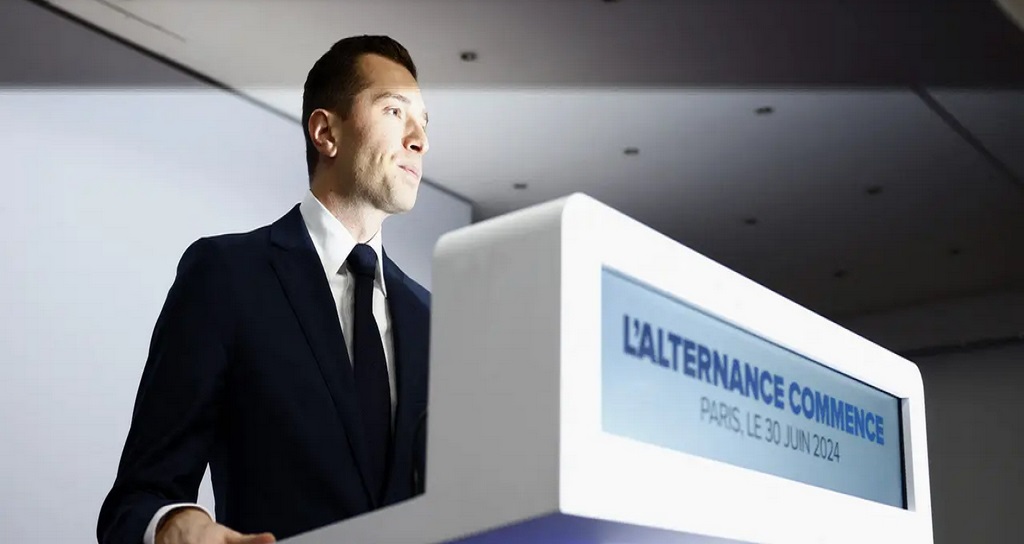The Demonization of the Left
After winning the first round of the French parliamentary election, the head of the right-wing populist Rassemblement National is fighting for an absolute majority. His main opponent is no longer the Macron camp, but the left-wing alliance.
The Rassemblement National’s Victory and the Shift in Focus
The first round of the French parliamentary election saw a surprising victory for the right-wing populist Rassemblement National (RN) party. Its leader, Jordan Bardella, is now setting his sights on securing an absolute majority in the second round. However, his main target has shifted from the Macron camp to the left-wing alliance, known as the Nouveau Front Populaire.
Bardella has been warning urgently that the controversial leader of the left-wing radical La France Insoumise (LFI) party, Jean-Luc Melenchon, could become the next head of government. Despite denials from many left-wing politicians, Bardella is using this fear-mongering strategy to win over voters.
“I am aiming for an absolute majority in order to rebuild the country. I am the only one who is able to beat the left-wing leader Jean-Luc Melenchon,” says Bardella. He is portraying himself as a bourgeois bulwark against the “left-wing anarchists”.
The Demonization of the Left
Mathilde Panot, the former leader of the LFI parliamentary group, is fighting against the demonization of her camp. She believes that President Emmanuel Macron is to blame for this, as he had declared the left to be just as dangerous as the extreme right during the election campaign.
“This logic is evidence of a moral failure,” says Panot. She argues that her party cannot be put on the same level as people who say that Hitler did not kill enough Sinti and Roma. “If you have people on the extreme right who say that there are two types of French people – the real ones and those who are only French on paper, then we have to stand up and resist being tarred with the same brush.”
Macron’s U-Turn and the Dependency on the Left
During the election campaign, Macron had warned of a civil war if the extreme right or left camp came to power. However, now that the RN is at the gates of power, Macron is dependent on the left-wing alliance to prevent them from gaining an absolute majority in parliament. This has led Macron to make a U-turn, calling on his own candidates to withdraw their candidacy in the runoff election whenever a leftist is better placed to beat the RN.
This blatant turnaround has not been welcomed by everyone. Yael Braun-Pivet, the President of the dissolved parliament, accuses some members of the far-left LFI of anti-Semitism. “The vast majority of those in the left wing stand for republican values, I can support them – Greens, Socialists, Communists,” says Braun-Pivet. “But with La France Insoumise, I look at each case on a case-by-case basis. I’m sorry, I differentiate.”
The Hangover After the First Round
The first round of the parliamentary elections has left a hangover for Macron and his ministers. They discussed the next steps for hours in the Elysée, with French media reporting an extremely tense atmosphere. Everything seems lost from the Macronists’ point of view.
The RN is at the gates of power, the left is strengthened, and Macron’s own camp is not only defeated but also divided. Macron has lost the support of many of his own people, and he still hopes to be able to pull the cart out of the mud somehow, but the situation is deadlocked. This is not a good starting point for the dreamed-of new start.
The Implications of the Demonization of the Left
The demonization of the left by the RN and, to some extent, by Macron himself, has serious implications for French politics and society. It creates a dangerous divide and undermines the democratic process.
By portraying the left as a threat to the country, the RN and Macron are playing on people’s fears and emotions rather than addressing the real issues facing France. This kind of rhetoric can lead to the marginalization of the left and the further polarization of the political landscape.
Moreover, the accusations of anti-Semitism against the LFI are particularly concerning, as they could be used to discredit and delegitimize the entire left-wing alliance. This is a tactic that has been used by right-wing and centrist politicians in the past, and it is important to scrutinize these claims carefully and ensure that they are not being used for political gain.
The Role of the Media
The media also has a critical role to play in this situation. It is important that they report on the issues objectively and avoid sensationalism or partisan rhetoric. They should provide a platform for all political voices to be heard and encourage nuanced, factual discussions about the challenges facing France.
At the same time, the media must be vigilant about the spread of misinformation and conspiracy theories, which can further fuel the demonization of the left. They should fact-check claims and hold politicians accountable for their statements, regardless of their political affiliation.
The Importance of Democratic Norms
Ultimately, the demonization of the left is a threat to the democratic norms that France has worked hard to uphold. It is essential that all political actors, regardless of their ideological leanings, respect the democratic process and work towards the common good of the French people.
This means engaging in constructive dialogue, finding common ground, and putting the needs of the country above partisan interests. It also means rejecting the politics of fear and division and embracing a more inclusive and collaborative approach to governance.
Conclusion
The French parliamentary election has revealed deep divisions within the country, and the demonization of the left is a concerning trend that must be addressed. It is up to all political leaders, the media, and the French people to work towards a more inclusive and democratic future, one that celebrates diversity and upholds the principles of the Republic.
